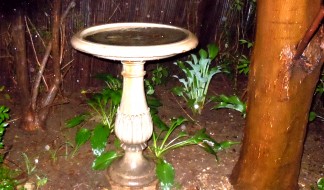
Irene
(Note: I attribute the title and theme of this poem, based on the word “Irene” to Shaykh Hamza Yusuf. While we were working on…
(Note: This is a poem for the Mawlid, honoring the Prophet Muhammad’s birth. In devotional poetry the honorific, “peace of Allah be upon him,” is assumed.)
When an object casts no shadow, what does it mean?
That its light is over all other lights
and no light can
come from any direction
and be stronger, cutting silhouette
outlines of form and laying them out
on a ground into which
all forms must go at last?
But Muhammad was such a one.
They said
he cast no shadow.
O Muhammad!
How can we find you here among the ruins?
How can we see you?
The catalog of his attributes can start from
anywhere and continue forever…
the way he parted his hair, the way he
greeted the poor and fed them.
He once filled a valley between two mountains with
the sheep of God’s bounty, until a
hardhearted bedouin who could only see sheep
had the eyes of his greed put out by the
dazzle of such generosity,
and he turned from
being greedy for world to being
ecstatic affirmer of God
carried away on the backs of fleece
soft as the hair of angels.
O Muhammad!
How can we find you here among the ruins?
How can we see you?
One man, longing to see you, nearly fell out of a date palm
when he heard you had come.
He had gone from teacher to teacher, each one
telling of your impending arrival.
Sweet date meat of a man, the lightningbolt of your
presence struck
and threw him down while collecting dates,
for his longing by then
had matured the meat of his
innermost sweetness, and his
pure heart
saw you at once!
O Muhammad!
How can we find you here among the ruins?
How can we see you?
Or is it that we’re not in ruins enough?
Is it that our fortified walls
have not yet toppled down?
That the glass we erect to see through and think
is so limpidly clear
is in fact
the opaque screen of our selves set up
for the magic lantern to throw its image on
with an illusion of movement and
the assumption of purest transparency?
But are we still too coarse, too thick, not
subtle enough in this
haggard age with its tapeloop rumors of
war?
The absolute nuclear outbreath
that deflates the entire material
system down to the last
particle, even this still
too dense, too
cartoon to contain
the spiritual emptiness needed in us to let
your pure Muhammadan
nature show clear?
O Muhammad!
How can we find you here among the ruins?
How can we see you?
The maddest love for the biggest diamond
is nothing compared to the
love your companions had for you —
they saw your truth was true,
your step sure, your word an opening into
God’s domain,
and one man spat out the grapes he was eating
and took the sword you offered
when he heard you say
that whoever took it and plied it
until he was killed in the way of Allah
would gain the Gates of the Garden, and enter it —
no doubt troubled him, no shadow cast
from your presence, only light —
so what is this
heartbeat one thousand four hundred years later
full of love for you
by people who never saw you
walking like a shadowless
mountain among them?
O Muhammad!
How can we find you here among the ruins?
How can we see you?
Your compassion for an ant trail, a thief, a wretched man
with one piece of rope in his household
and no other possession!
Take that rope, you said, and gather firewood which you can
tie with that rope
and sell it in the market. Then with the
money you earn buy more rope which means you can make
more bundles of firewood
and be on the increase, O always be on the
increase! —
the flow of creation which goes with the flow of
galactic billowing, opening its
giant petalled corolla
through eternal darkness,
our galaxy itself floating through space
like a flower opening,
constantly on the
increase!
O Muhammad!
How can we find you here among the ruins?
How can we see you?
Our galaxy opens its rose-like corolla of light
out through endless darkness,
and sight itself is
stunned when it
sights your sun!
O Light of Muhammad,
O shadowless one!
(from Mouloud, 1984)
Categories: Poems, The Prophet Muhammad (salallahu alayhi wa sallam)